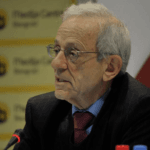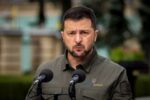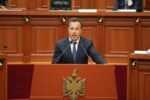The BBC’s special correspondent, Jeremy Bowen, has shared his experience during the war in Kosovo.
He recounted the moment of documenting the moments when the Serbian forces withdrew from the city of Prizren in June 1999.
“What was really great from a journalistic point of view about doing those stories was that we had access. Too often these days, and Gaza is a good example of that and I’ve tried to report that story, we don’t have that access. But then we had that access in Kosovo and we were there as things were happening and we were able to capture some very powerful scenes that really showed the depth of the conflict, the gulf between the two sides and how there was so much a lot of hatred from both sides”, said the BBC journalist, in “Kallxo Përnime”.
He added that he entered Kosovo together with NATO forces.
“They didn’t let us in. But we were able to enter with NATO. Then the whole country opened up. Because we entered at the same time as the troops and were then able to move freely, the only real limitation was the fear that we might step on a mine or some unexploded bomb. We were able, as you will remember, to go into places when they were opened, when people had not seen foreigners for a long time, when there were still, in some cases, bodies lying around the place, of course evidence. , fresh evidence of the crimes that had taken place, of the massacres”, said Bowen.
He also told about an elderly Serbian woman in Prizren who kept her husband’s corpse for 1 week in her apartment.
“Yes, we heard, someone heard it was said, someone on our team heard it was a woman and there was probably a body in the building with her in her apartment. It was right in the center, in fact, in Prizren. She was old and really confused. We went to knock on the door and she hesitated to open it. But then we managed to get inside. She let us in. We found that her dead husband’s body was in the building. We could smell it. It was in the apartment with him in their apartment, wrapped in a rug.”
“She had wrapped him in a rug. She was confused about the details, but more or less said that he had died during several raids by KLA forces. She had hinted that maybe they could have killed him or maybe he just collapsed. We just don’t know. She was too confused to make much sense. But the fact was that the dead man was there. We saw it. “For a few days, the body was rotting,” he added
Bowen has been a part of the BBC for 40 years, as long as he lent the materials of the last war in Kosovo to the “Reporting House”, which will remain open until mid-September.







